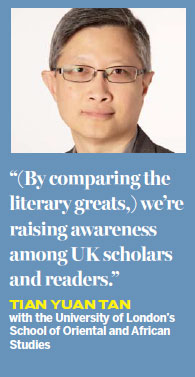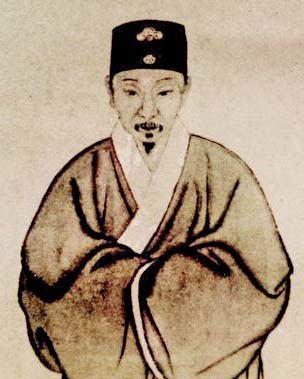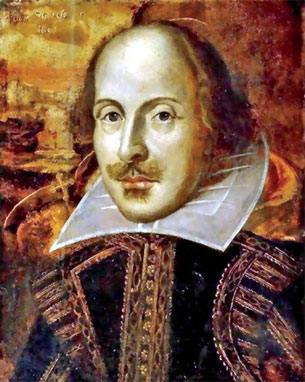When the Bard met his Chinese match
Updated: 2016-04-08 08:19
By Wang Mingjie(China Daily Europe)
|
|||||||||
The play will be staged in Leeds, Edinburgh, and three cities in China from July to September, and is organized by the University of Leeds Staging China, its Business Confucius Institute, and the University of International Business and Economics in Beijing.
As the cast will mostly be made up of Western actors, the show will be a spoken word performance with musical accompaniment. "Spoken word presents an opportunity to break with convention while still being inspired by it, and create a new world for Tang's characters to inhabit," Ansell says.
This year's London Book Fair will also feature a discussion on Shakespeare and Tang and their impact on drama, to be staged at Olympia London on April 12, organized by China Universal Press and Publication Co.
In March, Zou Yuanjiang, a philosophy professor at the University of Wuhan and vice-president of the Tang Xianzu Research Society, was invited to talk on The Peony Pavilion at several British universities.
Such tours "not only illuminate the work of a legendary Chinese writer to audiences in the UK, but also have a great impact" among young Chinese people, according to Li Ruru, a professor of Chinese theater studies at the University of Leeds, who helped organize Zou's visit.
By comparing the literary greats, "we're raising awareness among UK scholars and readers, so that they look more carefully at what is out there in terms of Chinese classics", adds Tian Yuan Tan with the University of London's School of Oriental and African Studies, who coauthored the book 1616: Shakespeare and Tang Xianzu's China.
Adam Strickson, a fellow in theater and writing at the University of Leeds, who studied the works of Tang and Shakespeare, says both "shared a love for mixing low life or the bawdy with the sense of a tortuous moral journey of self-discovery".
They also use dense and layered poetry to go beyond the surface, he says, while the metaphor of the dream as a journey of confusion and enlightenment is central.
"I have the sense both were involved in a religious quest for meaning, and that this revolves around an exploration of loss, grief and reconciliation in the family".
The difference, he adds, is that the Bard's work represents people of all backgrounds and classes, whereas Tang's works seem to come from a more aristocratic and esoteric background.
wangmingjie@mail.chinadailyuk.com
|
Tang Xianzu(1550-1616) A playwright and litterateur of the Ming Dynasty (1368-1644), he was born in Linchuan, which is today in Jiangxi province. He served as an official in Jiangsu, Zhejiang and Guangdong provinces. His major plays are collectively called Four Dreams, which includes The Peony Pavilion, The Purple Hairpin, The Handan Dream and A Dream Under the Southern Bough. |
|
William Shakespeare(1564-1616) The English poet and playwright is widely regarded as the greatest writer in the English language and the world's preeminent dramatist. He was born and raised in Stratford-upon-Avon. His works, including collaborations, consist of about 38 plays and 154 sonnets. His most famous works include Romeo and Juliet, Twelfth Night, Hamlet, Othello, King Lear, Macbeth, A Midsummer Night's Dream and The Winter's Tale. |
Today's Top News
Embryos growing in space a 'giant leap'
Russia to defend regional security jointly with China
Passage to piraeus
In the hall of the great frescoes
World Bank joins AIIB on financing for joint projects
GM seeds to get oversight
Russia-China ties benefit both countries, peoples
China, UK showcase best books in London
Hot Topics
Lunar probe , China growth forecasts, Emission rules get tougher, China seen through 'colored lens', International board,
Editor's Picks

|

|

|
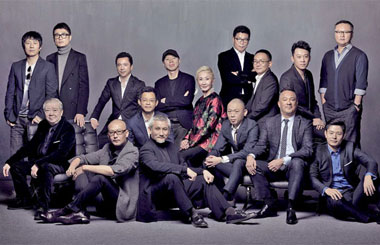
|
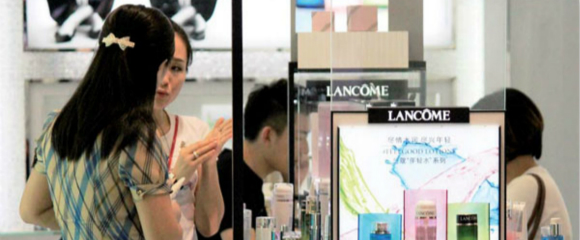
|

|
